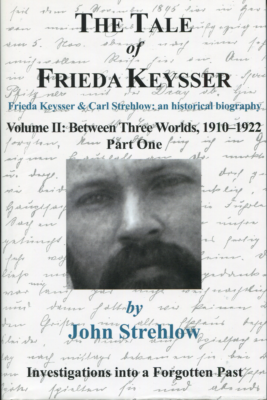
The Tale of Frieda Keysser (Volume II)
$100.00
It is September 1910. Now back in Germany, Frieda is hoping the Australian adventure is over. The children are put into school – and then comes the first shock: the boys are all remedial students, several years behind their age group. Only Martha is in a class with girls her own age. Next comes the news that Leonhardi, Carl’s editor, has died from a stroke. Will Carl’s book continue to be published? While he makes a tour of mission societies in Bavaria, Frieda is left to cope with the children on her own. Worse is to come: Carl’s superior, Rev. Kaibel, dismisses his work at Hermannsburg as a failure, alters all the arrangements then returns south, leaving Carl’s inexperienced replacement, Oskar Liebler, in charge of a work force of rebellious employees unwilling to take orders. Carl’s friends in Australia warn him if he doesn’t come back, his life’s work will be lost. Letters from the Aranda Christians follow, begging him to come back to Australia with his children. Though a good job is available for Carl in Bavaria, much to Frieda’s dismay they return to Australia at the end of 2011, leaving all their children but Theo, the youngest, with family. In the meantime, Carl is invited to speak to Frankfurt’s Anthropological Society members. His lecture is a great success, so secures the continued publication of his book.
Back in Australia, after spending the summer’s heat in the south, the three Strehlows return to a warm welcome from the Aranda, delighted that the family is back. By now events in Europe are looking grim, with continued tension over the size of the German navy and the steady break-up of the Ottoman Empire, with Britain, France and Russia jostling to incorporate large parts of it into their empires; the Kaiser on the other hand thinks the Turks should keep those parts of their empire which are outside Europe.
The scene is now set for the First World War. With Australia a loyal part of the British Empire, persons of German descent become enemy aliens and prison camps are set up for those considered a national risk. The Northern Territory is no longer part of South Australia, so despite his oldest son fighting in the German army on the Eastern Front, Carl is not in immediate danger, but newspaper campaigns to get young men to enlist and fight the Hun lead to constant attempts to have Hermannsburg taken over as an orphanage for half-caste children run by men of “sound English commonsense”. Carl’s professional rival Baldwin Spencer pours anti-mission propaganda into the ears of government ministers in Melbourne, yet his efforts are fruitless. The Mission continues to flourish, its population grows steadily, Carl translates the New Testament into Aranda, and in 1917 even becomes accepted as part of the British ruling elite! After the defeat of the Central Powers, the national mood relaxes, but no replacement can be found so Carl and Frieda can leave Australia and rejoin their other children in Germany. In 1922 Carl falls seriously ill and, after securing Hermannsburg’s future, makes a desperate attempt to reach a doctor. Halfway to the Oodnadatta railhead he dies at the Horseshoe Bend pub, leaving Frieda to travel with Theo to the south to an uncertain future.
The Tale of Frieda Keysser (Volume II)
Frieda Keysser & Carl Strehlow: an historical biography. Volume II: Between Three Worlds, 1910-1922. Investigations into a Forgotten Past.
ISBN: 978-0-9567n 558-1-0
1218 pages; 329 illustrations, B&W, sepia and colour, most never published before, including 5 maps, one a fold-out map; timeline; dramatis personae; 5 appendices, index. Hardback. Wild Cat Press, London 2019.
Arriving in Germany in 1910, Frieda and Carl attend to their children’s education. None want to stay in Germany but are told they are here to be educated: their parents will return from Australia in 1920. In October Leonhardi dies of a stroke, leaving Carl’s book without an editor. In January 1911 Carl’s lectures to Frankfurt’s Anthropological Society are a sell-out success, so Museum Director Dr Bernhard Hagen continues publication, but omits the grammars and vocabularies.
Back in Australia, Chairman of the Board Kaibel encourages the Loritja to settle on the Mission. His changes lead to friction between the white staff. Carl’s replacement Oskar Liebler threatens to resign unless those undermining him are dismissed, so reluctantly Kaibel agrees. Smarting from Carl’s criticisms of his and Gillen’s work, Spencer arranges for damning reports on Hermannsburg to appear in the press so the Commonwealth Government will resume the Mission. He wants to set up an orphanage for half-caste children, known today as ‘The Stolen Generation’. Alarmed by what is happening, the Aranda write to Carl and Frieda, begging them to return with their children. Only Theo returns. Frieda is stricken with guilt about leaving the other children in Germany.
During World War I, Carl is officially an ‘enemy alien’, yet Administrator Gilruth negates Spencer’s plan and the Mission survives. Frieda’s work with the mothers and children means its population is growing. Sensing that the Lutheran are losing the will to continue their missions, Carl uses the censorship of his letters to communicate with government ministers, and through Hillier opens up dialogue with Bishop White to see if the Anglicans will take over if Hermannsburg is abandoned. A second time the Mission is saved.
The war ends but no successor for Carl can be found, so he delays his departure until 1923. By now his health is failing. Having secured Hermannsburg’s future with Administrator Urquhart, in October 1922 he sets off south to reach a doctor but dies at Horseshoe Bend half-way to the railhead at Oodnadatta, leaving Frieda to carry on south with young Theo on her own.